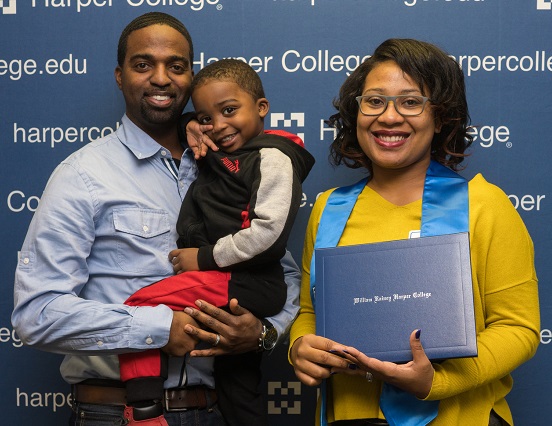Harper Alert: Due to extreme cold, Harper College campuses will be closed Friday, January 23. Learn more: http://bit.ly/36jRbZ8

 If you were a temporary file clerk sitting in the lunch room with a bunch of corporate
executives, would you have the nerve to point out that a piece of the company’s financials
just wasn’t adding up?
If you were a temporary file clerk sitting in the lunch room with a bunch of corporate
executives, would you have the nerve to point out that a piece of the company’s financials
just wasn’t adding up?
Noel Dickerson did.
During the day, Dickerson's job was to file invoices – lots of invoices. At night, she was a student enrolled in Harper College’s Fast Track program pursuing her Associate in Applied Science in Business Administration itemprop="articleBody">with a management specialization
In one of her classes, her instructor gave an assignment about profits and losses and encouraged the students to use real world situations as part of their analyses. itemprop="articleBody">Dickerson used what she had on hand – the company’s invoices she was filing. In working her way through the assignment, itemprop="articleBody">she realized the numbers weren’t adding up. The difference between the itemprop="articleBody">cost of goods sold and the amount billed to their e-commerce client was too low. So, at lunch one day, she mentioned the disparity to the vice president.
Dickerson explained that she discovered it as part of her school assignment and went on to detail what she uncovered. The VP was impressed by her initiative and thoughtful analysis and mentioned it to her director. This recognition — along with her hustle and job performance — led to a promotion at the company, the first in a long line of promotions.
In the past five years alone, Dickerson has received four promotions, going from temporary file clerk to e-commerce lead with 14 people on her team. Along the way, she completed two business certificates and an associate degree through the Fast Track program at Harper.
“My studies have taught me to look at how the pieces fit in the big picture,” she said. “Now, thanks to my marketing and finance classes, when I go into meetings with the VPs and the directors, I can talk about what companies like Walmart are doing and ask how we are going to position ourselves to be competitive.”
Harper’s Fast Track program is designed for busy working adults like Dickerson who know a college degree is important in today’s economy. Fast Track is an accelerated program that uses a cohort model and blends classroom and online learning. Most classes are offered in five to eight-week sessions with a predictable, evening class time. The cohort format encourages the students to develop strong bonds that help support their progress through the program. The faculty are specially trained and attuned to the needs of an adult student.
Kathy Foldvary, a professor who has been teaching Fast Track students since its inception, enjoys her adult students.
“They are highly engaged and bring a great deal of experience and knowledge into the classroom. These students challenge me, as their teacher, to provide them with ways to make the material valuable,” Foldvary said. “My goal is to help my students succeed in their position and their life goals.”
“Harper has some of the best instructors. They are so accessible and knowledgeable,” Dickerson said. “The culture at Harper fuels my educational spirit.”
The last five years have been filled with change for Dickerson. She got married, had a baby, bought a house, earned her associate degree and has moved up in her career. But that’s not where her story ends. Dickerson is pursuing her bachelor’s degree in business administration and a career as an e-commerce business analyst.
“I am still grinding it out, still moving forward. E-commerce is rapidly evolving, and I need to keep pace,” she said. Currently, she is taking classes three nights a week - one night at Harper’s University Center for her bachelor’s program and the other nights she is working on her digital badge in project management.
Fast Track is currently itemprop="articleBody">offered at itemprop="articleBody">the Harper Professional Center in Schaumburg. Future plans call for a new building on Harper’s main campus that would be home to the Fast Track program, bringing students closer to resources and support services. The building would also serve as a hub for regional economic development by housing the University Center, Small Business Development Center, customized business training and other entrepreneurial initiatives.
The proposed building is part of a larger community-driven plan for Harper’s future. Voters will consider the referendum question — which wouldn’t raise taxes — on November 6.